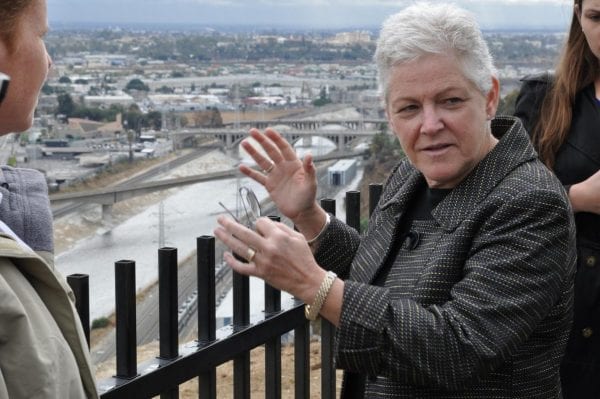
Oklahoma and Nevada Latest States to Fight Harmful EPA Regulations
Taxpayers Protection Alliance
April 6, 2015

EPA Adminstrator Gina McCarthy
Last month the Taxpayers (Protection Alliance (TPA) wrote about legislation from Tennessee and West Virginia that would protect consumers and taxpayers from proposed 111(d) regulations from the Environmental Protection Agency (EPA). These new rules on greenhouse gases from existing power plants, which mandate a 30 percent cut in carbon emissions at fossil fuel-burning power plants by 2030, have become a de facto battle in the larger fight for federalism against federal agencies in recent years. The EPA wants to use the decades-old Clean Air Act as proxy authority to force states into compliance with the new rules, which would damage state and local economies with potential tax hikes. State legislatures and governors around the country are acting to reclaim authority so that the EPA would be powerless in their attempts to enact what could potentially be an extremely damaging regulation for taxpayers and small businesses.
Two states, Nevada and Oklahoma are the latest to offer legislation that would states to retain power, not the EPA. Nevada Senate Bill 438 will be heard in the state’s Senate Natural Resources Committee on Tuesday April 7th. This bill would ensure that any plan going forward regarding the EPA rules must get approval from the state legislature. The National Taxpayer’s Union recently endorsed the legislation in a letter to the bill’s chief sponsor, Nevada State Senator James Settelmeyer who serves as Chairman of the Senate Committee on Commerce, Labor and Energy:
Your bill would take an important step toward ensuring that residents of the Silver State are not excessively harmed by the EPA’s actions. It would require that the implementation plan developed by Governor Sandoval’s administration is also approved by the Nevada State Legislature before being submitted to the EPA. This approach will not only help to build consensus among Nevada public officials over a policy with major economic implications for the state, it will also provide a further level of accountability to those who will be most affected by that policy.
Oklahoma legislation is making its way through the State House after being unanimously passed in the State Senate earlier last month. Senate Bill 676 has the same goal in guaranteeing power to states when it comes to any plans for EPA regulations through the new rules using the Clean Air Act. Senator James Inhofe (R-Okla.) and Oklahoma Attorney General Scott Pruitt have been two outspoken critics of the EPA’s power grab. The two elected officials co-authored a strong endorsement of SB 676 last week:
Senate Bill 676 authored by Sen. Greg Treat, R-Oklahoma City, and Rep. Jon Echols, R-Oklahoma City, would allow for legislative oversight of carbon dioxide emissions plans submitted to EPA to ensure the plan in fact complies with the Clean Air Act. This common-sense bill will ensure any decisions about Oklahoma’s energy future will ultimately be held in the hands of our elected officials, not federal bureaucrats.
The two bills from Nevada and Oklahoma are welcome news and it seems to be a growing trend. Many officials at the state level are beginning to recognize that the impending EPA regulations are going to be extremely damaging to the livelihood of many citizens in their state. These rules will harm not only those operate in the energy sector, but also those who work in industries dependent on the energy sector. This is evidenced by recent news about increased state action on the 111(d) regulations:
So far in the 2015 session, legislatures in 27 states introduced 72 bills or resolutions related to the Clean Power Plan and power plants carbon dioxide emissions regulations. Specifically, 21 states have introduced bills and three states—Arizona, Arkansas, North Dakota and West Virginia—have enacted legislation (see chart below). An additional 15 states have introduced 23 nonbinding resolutions and seven of these states have adopted resolutions.
Taxpayers and consumers should be pleased to see more states confronting the EPA over regulations. TPA will encourage more states to take up this fight and ensure the EPA will not overreach their authority.
